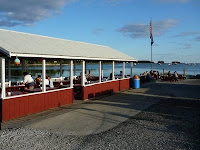
The usual sequence of events that takes the dog from vertical to horizontal on the trip across state lines is as follows:
- Start off in the back seat but get your skinny butt into the passenger's lap as soon as possible.
- For 20-30 minutes, tremble with fear, as it's unclear if the trip will end in some torture conducted by the groomer or the vet.
- Start to calm a little, ie, sink into long-suffering arms until a turn signal or lane change or slight slowing down or buzzing fly on the dashboard provokes new fear and fresh trembling. Go upright.
- At the hour mark, give or take 15 minutes, give over to trust and sleep, draped willy nilly across arms and legs, for the next two hours.
Yesterday, however, I drove to Maine with no passenger lap on offer. The solution, I figured, was to take along the doggy bed as a substitute. We set off, and all was well for the first few minutes. Mia settled into her bed as soon as we reached the highway.
Then I looked over at her and got my first inkling that all was indeed not well. She was lying in her bed, fine and dandy, but her head was perched on the side wall and she was staring at me. I don't know if dogs blink; she didn't for ten minutes; I checked almost continuously. She was unyielding, knowing that I was carrying her off for some disaster. Her face was pathetic.
Clearly, none of my assurances and invitations to rest gave her relief and she turned and twisted and trembled all the way through Massachusetts, finally giving in as we crossed into New Hampshire. Perhaps she thought that now, surely, having crossed a state line, someone like the FBI would be on the case and she could relax a bit. There was a brief disturbance at the toll booth as she tried to signal for help. Then she actually seemed to sleep for a bit, although her eyes were partly open.
Until we hit the Piscataqua bridge. I don't know if it was the soft curse I uttered at the driver tailgating me, or the smell of the tidal river, but Mia bolted upright at the height of the span and wouldn't be comforted. Maine doesn't necessarily give her great vibes; she's a people, after all, and shouldn't have to deal with large dogs and wild deer. For me, of course, the moment is heaven. Not even the awful sprawl of Kittery's outlet stores can blunt the sweet smells and salubrious scents of the piney woods and the ocean air.
Her distress lasted all the rest of the way. She was starting to give up to her fate around Brunswick if we hadn't stopped to deliver forgotten goods to the college senior; unfortunately, as soon as we turned towards Bowdoin, she knew she was about to see her big sister. And with that reminder of home, comfort, love, and happiness (all the things I didn't represent at the time), she wasn't about to believe me anymore and was restless all the way to Owls Head.
So today I've been extra nice (treats, a walk on Crockett's beach, a session of rope pulling), pathetic in my own way in asking forgiveness for my crimes. I believe she has forgiven me. At the moment, she's behind me on the blue couch, napping without staring.










































